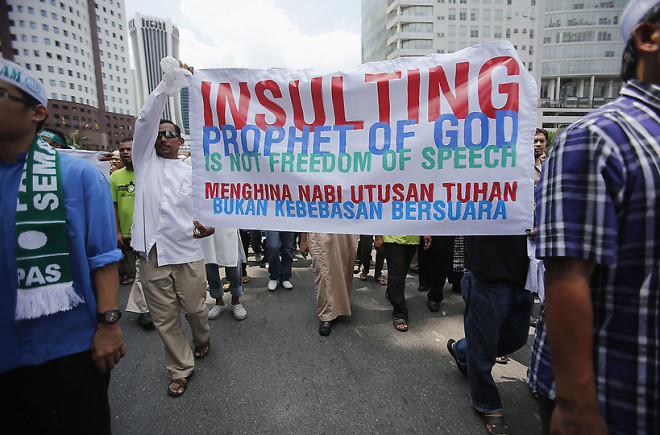Freedom of Religion vs. Freedom from Religion
In many of the countries which have seen recent protests against the film “The Innocence of Muslims, ” their still-fresh Arab Spring revolutions were aided by new online forms of speech like Twitter and Facebook. Social media’s role in the Arab Spring is old news, but the events of the past two weeks show a sharp double standard between speaking out against the government and speaking out against the majority religion.
The 14-minute American-made movie trailer was dubbed into Arabic the first week of September and incited both peaceful protests and violent riots in more than 22 countries of the Middle East. Google made the decision to block the film in Libya, Egypt, and Saudi Arabia. Days later, the satirical French magazine Charlie Hebdo published cartoons with offensive caricatures of Muhammad and ridiculed the Muslim world’s response to the video. The French publication itself has a circulation of about 55 thousand, but the Internet made the viral content available to a global audience teeming with righteous indignation.
The cartoons bring to mind a similar set of drawings that appeared in a Dutch newspaper in 2005. The series of 12 degrading Dutch cartoons caused over 200 deaths and injuries during riots in the same countries currently rejecting “Innocence of Muslims.” In 2005, Danish ambassadors had to withdraw from Iran, Indonesia, and Syria for fear of their safety, a tragic foreshadowing to the murder of Ambassador J. Christopher Stevens and other staff of the U.S. Consulate in Benghazi on September 11, 2012.
The motivations for the protests aren’t just grounded in conservative Islam; this isn’t just another skirmish in the East/West cultural stereotype war. After interviewing protesters in Cairo, New York Times reporter David Kirkpatrick makes this observation:
“When the protests against an American-made online video mocking the Prophet Muhammad exploded in about 20 countries, the source of the rage was more than just religious sensitivity, political demagogy or resentment of Washington, protestors and their sympathizers here said. It was also a demand that many of them described with the word ‘freedom’, although in a context very different from the term’s use in the individualistic West: the right of a community, whether Muslim, Christian, or Jewish, to be free from grave insult to its identity and values.”
In most states of Western Europe, denying the Holocaust is criminalized. It is widely believed in the Arab world that the United States has the same law. The spiritual leader of Egypt’s Muslim Brotherhood, Mohamed Badie, is calling for the West to adopt the same laws as Egypt concerning the three Abrahamic religions: offensive remarks should be outlawed entirely. No secular democracy should be expected to conform to philosophies of free speech shaped by decades of state-controlled media and an inseparable link between “temporal and spiritual authority.” Still, the Holocaust laws are now raising an issue about which religious sensiblities to protect and which to leave undefended. Indonesian President Susilo Bambang Yudhoyono’s response to the Danish cartoon scandal has come back to haunt fragile Arab-Spring countries in the wake of the protests: “It sends a conflicting message to the Muslim community: that in a democracy it is permissible to offend Islam. This message damages efforts to prove that democracy and Islam go together.”
How can successful American foreign policy be maintained when fundamental principles of one nation allow for attacks on another nation’s values? Since this is such a touchy issue for governments to deal with (especially for the United States in an election year), responsibility is being laid on the global networks responsible for the proliferation of controversial content. The private media hosts had the power to choose what parts of the world could be exposed to the film. “Hate speech” is banned by Facebook and Google (and subsequently Youtube), but who can appease the mores of an entire planet? Still, the filmmakers could possibly be prosecuted on a different free speech technicality. The death of hundreds in the Muslim world literally classifies “Innocence of Muslims” as fighting speech, a type of speech outlawed in the United States and by international courts. If offended parties can prove that the video was designed to cause violence, the case could violate international law. Currently, the violent element of the protests is being quelled by national governments, who need to present a friendly stance to the U.S. government for receiving foreign aid. The peaceful protesters may never get what they are fighting for, but stopping them would be violating freedom of assembly, and to be fair, we have enough debate about international speech to fill headlines for the rest of 2012.
